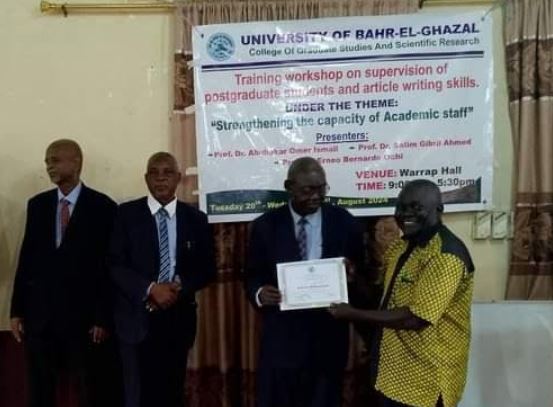The University of Bahr el Ghazal in Western Bahr el Ghazal State on Tuesday launched a training program for consultants who will supervise postgraduate students and teach them article writing skills.
The training aims at equipping academic staff with advanced skills for supervising students and was launched under the theme “Strengthening the Capacity of Academic Staff.”
The Acting Dean of the College of Graduate Studies and Scientific Research, Dr. Rabeh Yousif Mubarak, emphasized that the primary goals of the workshop are to provide academic staff with essential knowledge and skills for effective supervision and article writing. He highlighted that the training is designed to address common issues faced by supervisors in their interactions with postgraduate students.
“The general objectives of the workshop are to enhance the academic staff’s ability to guide students effectively and to address the prevalent challenges in supervising postgraduate research,” he said. “We have specific objectives which are highlighting the problems commonly facing supervisors in communicating with postgraduate students and also to identify and bridge gaps in attending college supervision to raise the careers of the academic staff in writing skills at the graduate level.”
For his part, Vice Chancellor Prof. Dr. Erneo Bernardo Ochi underscored the significance of the workshop, noting that it is a pioneering initiative at the university and is vital in equipping academic staff with the knowledge necessary for mentoring and coaching students effectively.
“Our first objective is to equip you with knowledge and signs in academic supervision of postgraduate diploma students or master degree students or PhD students so that you identify and bridge the gaps that you do have now,” Prof. Ochi told the participants. “To become an associated professor, at least you must have some publications in the form of books, publications in the form of research, and not less than fifteen to twenty articles.”
The vice chancellor also illustrated that writing research articles requires precise skills from title assortment to referencing. He encouraged the participants to fully engage in the training with a commitment to gain competencies for their mentoring capabilities.
“Writing a research article involves several steps, including selecting the research title, outlining objectives, methods, introduction, discussion, acknowledgments, and references,” Prof. Ochi stressed. “This workshop is designed to help you develop these skills.”




